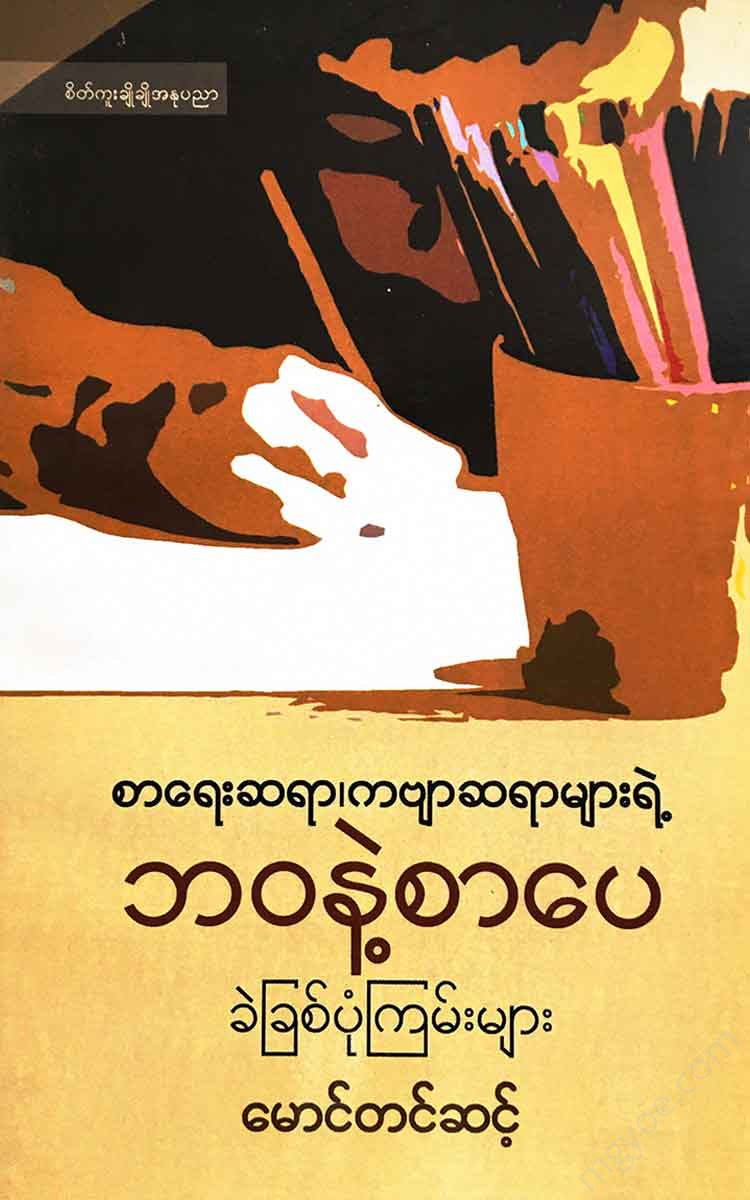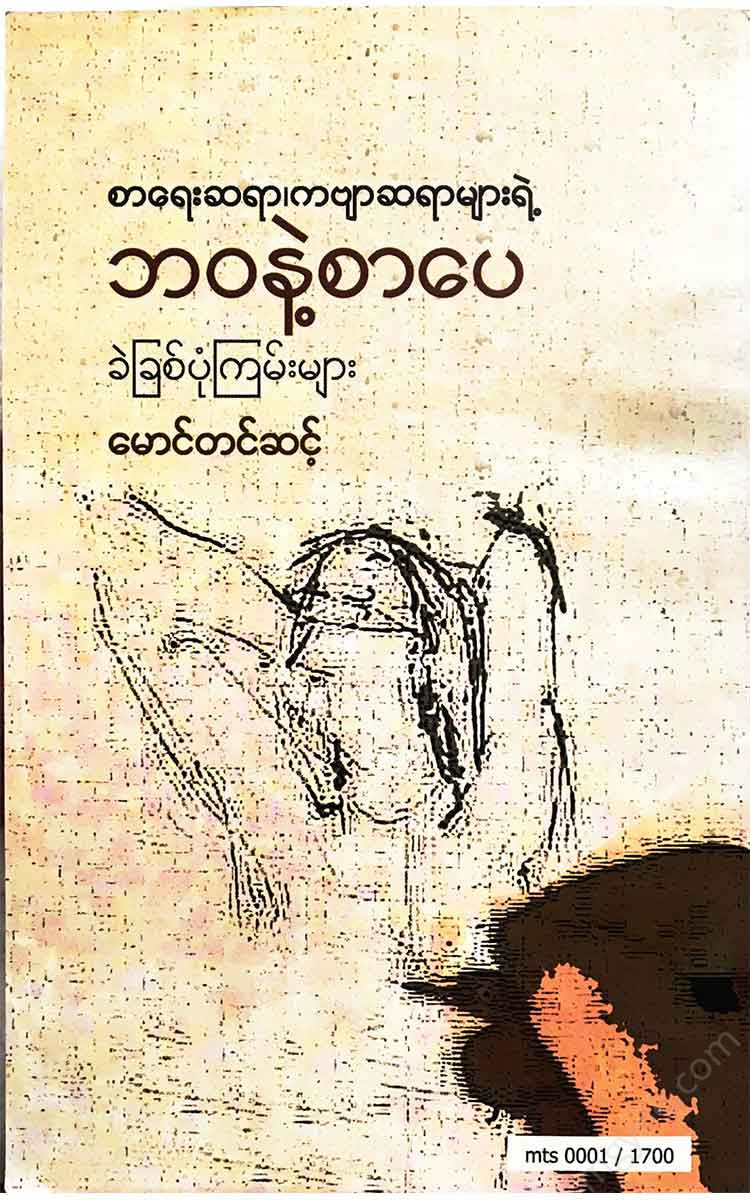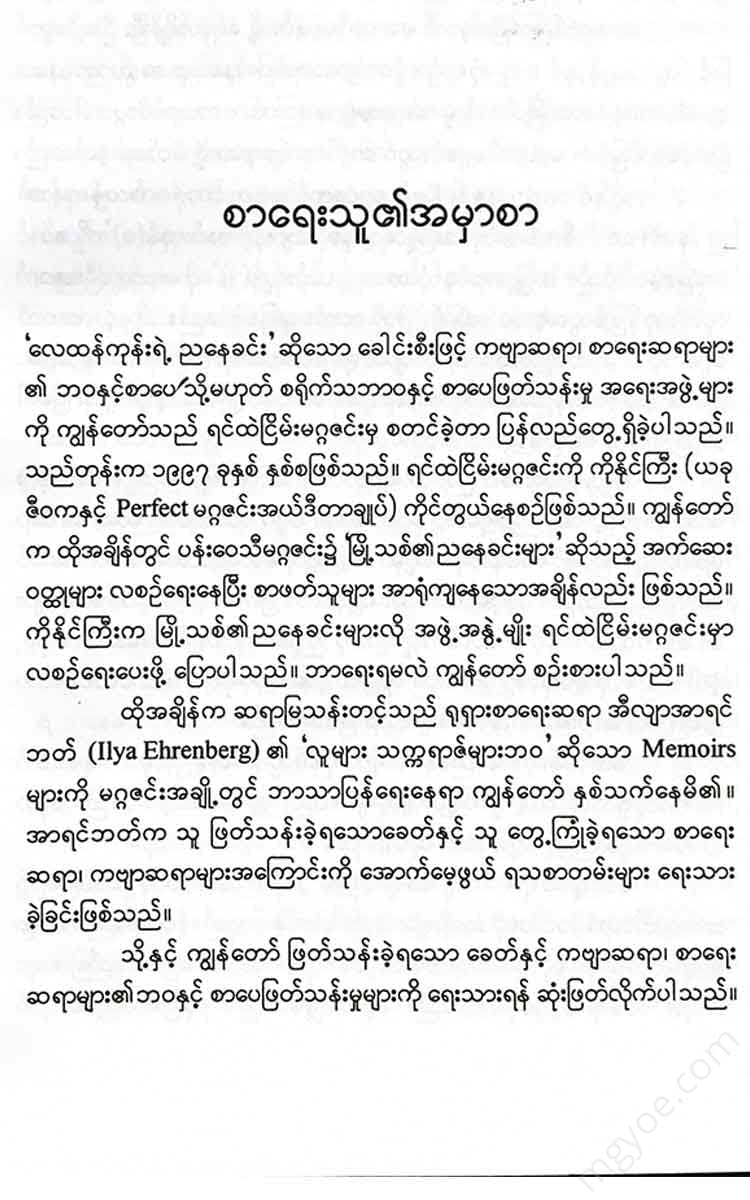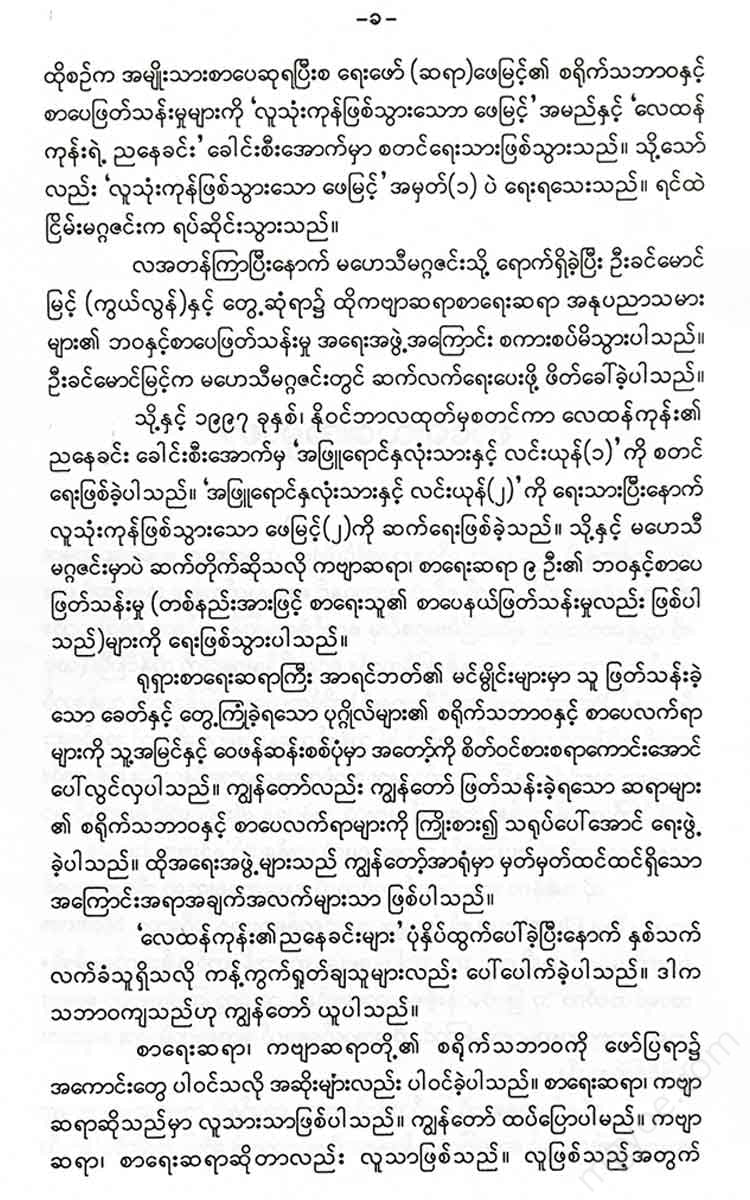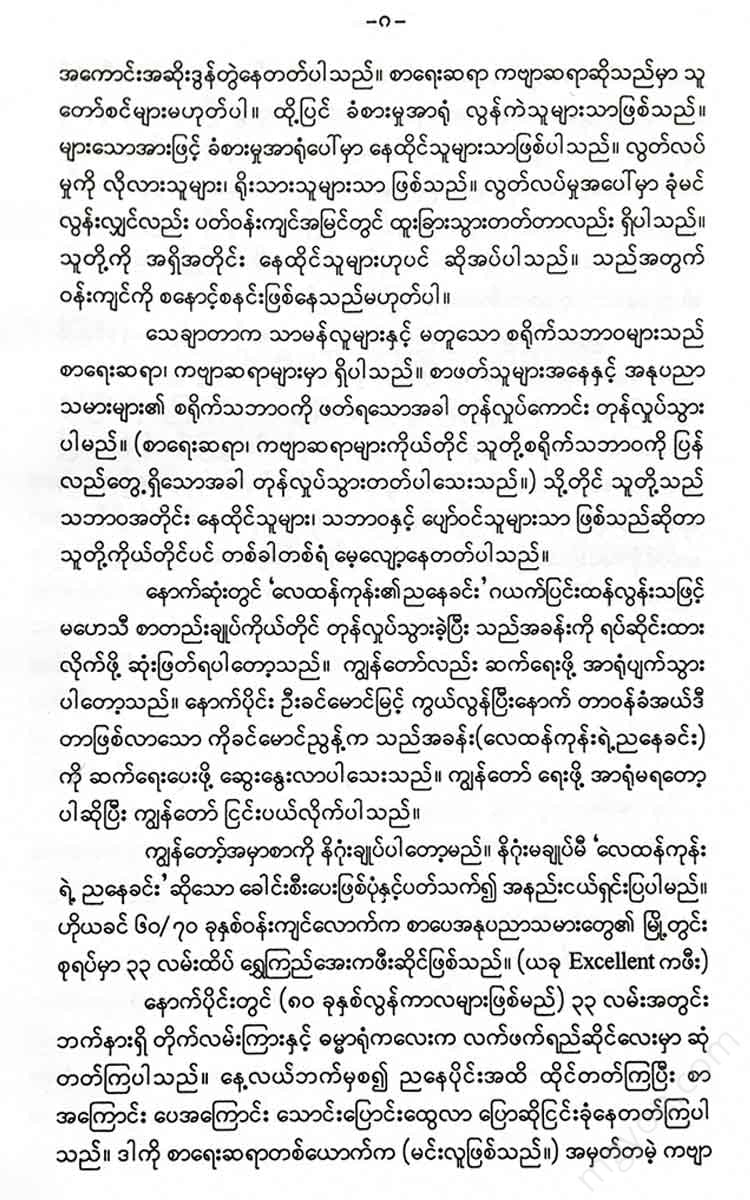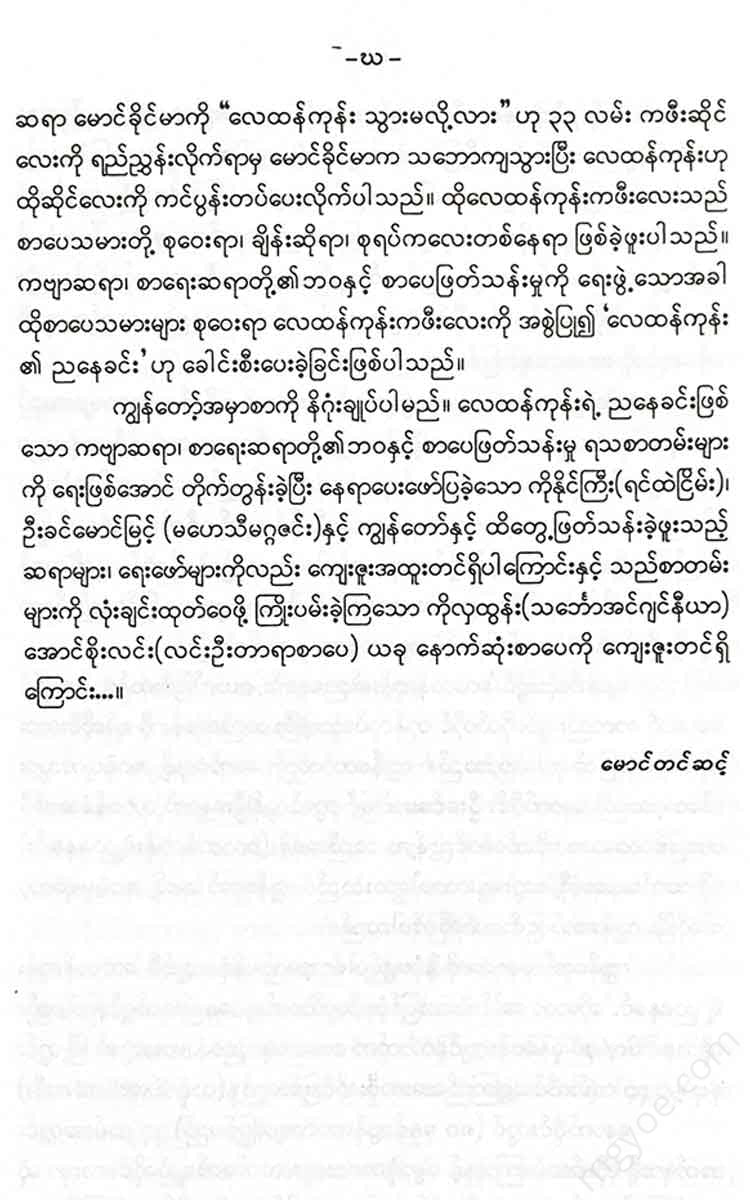Other Websites
Maung Tin Sint - Pencil sketches of life and literature
Maung Tin Sint - Pencil sketches of life and literature
Couldn't load pickup availability
White heart and eagle
Near the tea shop on 33rd Street, Ley Than Kone, a European-style bag (I don’t know who called it a suitcase) was hanging out, a white long-sleeved shirt was fully buttoned, and a long-sleeved shirt was worn down to the tips of the legs. He was pale and small, with a slightly bent waist, and he walked around the street, meeting friends and students, young and old, people he met, invited or not, and sitting around the table he met. He had a nose like an eagle, and his hair was already white and flowing. That person was (my teacher) Maung Lin Yun (Shan State).
In 1993-94, you didn’t see Mr. Shan on 33rd Street and at Le Thang Kone Cafe very often. People (especially people in the art world) change a lot, even in a short period of time. Some poets and writers who used to hang around Le Thang Kone Cafe, such as Myay Chit, Maung Lu Mon, Zaung Htet, etc., have disappeared or died. Some have disappeared. Some have disappeared without their own will. Some have disappeared by their own will. Some have changed. In the same way, new young people have also been entering the vacant space. That is, in the art world, there are those who have fallen away and disappeared, and new flowers are blooming. There are those who have remained unchanged from the beginning (until now), sitting, wandering, and standing.
These past two years, Saya Lin Yun (Shan State) (our students call him “Saya Shan.” Those close to him call him Shan Gyi.) has been almost invisible around that windy hill. Not for any other reason. Only due to poor health.
In 1993, when I heard that Teacher Shan was hospitalized with kidney disease, I didn't go there right away. It's like an excuse, but it's true. Almost everyone (especially the people at the bottom) has to struggle very hard, even if not to death, to survive (no one dares to say it). That's why many of us have failed in social issues.
However, one day I went to the Renal Specialist Hospital of Yangon General Hospital. I didn't know which floor or room the doctor was in. The laboratory in front of the Renal Specialist Hospital was said to have a writer, Maung Nyo Pyar (the head of the laboratory). There is a clue that Ley Than Kone, who I don't know, said that if I meet Maung Nyo Pyar, I will send him.
In that laboratory, I climbed the stairs that were so crowded and scary (I still remember thinking to myself as I climbed the stairs that it would be great to film a horror movie in those places) and arrived at the room where Teacher Maung Nyo Pyar was. Maung Nyo Pyar was not there. He left for a while, so I went back down the scary stairs and sat on the ledge of a small staircase that went up and down to the ground floor, waiting for Maung Nyo Pyar.
If Ko Nyo Pyar doesn't come back here, the plan to come to Teacher Shan in a hurry will be ruined. In such a large hospital, it would be easy to ask U Myint Oo (Teacher Shan's real name) in which ward, room, and bed he is. Aren't there many U Myint Oos?
Let me tell you. I sat there and thought about Teacher Shan as if I were in a dream. (I don't remember whether I thought about it at the time or not. I have to write it in such a way that it makes the article readable. But I have to think about it somewhere here and there. But those events are real events. So, when Teacher Shan and I met, the teacher's image or character would emerge, wouldn't it?
I first met Teacher Shan at a lecture at a primary school in our neighborhood. At that time, I lived in Tanyin Kone Ward, Insein Township. I don’t remember whether the lecture was to commemorate Union Day or National Day. It seems that the students’ awards ceremony and the lecture were held together. At that time, the principal of that school was the poet Maung Hlaing Thwin (Insein). Since he was the poet principal, this lecture was held at night and in the open air in front of the school.
The teachers who would be preaching at that time were Maung Hlaing Thwin (Insein), Maung Lin Yone (Shan State), and Monywa Win Pe.
At that time, I had just moved from the sugarcane cement factory to the brick factory (Tanyingone). I had very little contact with literary circles. There were only a small group of us in the New Yangon area, namely Ko Htwe Nyo (Pathein Maung Htwe Nyo), Ko Myat Lun, Ko Pethi, Ko Pik Kung, Tae Ein Maung Nay Wah, etc. In the Insein area, there were not many. There were only Ko Kyi Naing, Ko Tin Ngwe and Ko Soe Nyunt (Soe Myint Latt).
However, regarding Ko Pethi, I had a close acquaintance with Monywa Win Pe. At that time, Monywa Win Pe was the secretary of the Insein Literary Workers' Association, and I think Teacher Shan was already on the executive board. I think Maung Hlaing Thwin (Insein) was also on the executive board. I must have just joined the Literary Workers' Association. I joined after contacting Ko Win Pe.
The writers who will speak are taking their places on the brightly lit stage. It was the first time I had seen Teacher Shan on stage, but we were already familiar with Teacher Shan's writings. Especially the poems of Teacher Shan and the plays written by Nguyen Van Troi and Pin Ko, such as "A Thit In Thit Sang Man Thit" and "Pwint Oo Myay Kha Wai Phluen Rang" published by the publisher "Shan Yoma Poems" jointly published with Maung Tin Myaing (In Lay). The collection of poems by anti-war poets, which was quite famous in our time (that book has now been translated into Japanese and English.), etc. Even before people saw it, I could clearly see the writer and poet I respected and loved.
The teacher's appearance was also exceptionally attractive. Since he was called Maung Lin Yoon (Shan State), I was guessing that he was of Shan nationality. He spoke in a roundabout way.
I was wondering if I should greet Ko Win Pe and the teacher while I was standing in the audience. I wanted to greet him. I wanted to greet Teacher Shan. I pushed my way to the side of the stage through the crowd and greeted Ko Win Pe. Ko Win Pe greeted me warmly and introduced me to Teacher Shan. The teacher didn’t seem to notice me at all. At that time, I had only written one or two short stories a year, so I wasn’t well-known to readers, let alone people in the literary world. But at that time, I had been writing for more than 10 years. I had already published a novel, “A Little Bit of Desert Water.”
I don't remember what the teacher said that day. I went home before the lecture was over. I remember seeing Teacher Shan and being thrilled to meet him.
Then I met the teacher at the literary workers' group meetings. We met once or twice and became close. From the first meeting, the teacher asked me what I was doing and where I was staying and told me that he was opening an English course, that he was teaching English reading and translation, that it was two days a week (Saturday and Sunday) in the evening, that office workers, workers, graduates and senior scholars. He said that he would teach poetry, articles, newspapers, etc. without any syllabus and that he would teach them as he pleased.
“If you have any employees from Tanin Kone who want to join, please let me know. I want writers like you to join.”
I understand the teacher's encouragement. But at first I was afraid. I didn't pass the tenth grade. My English is also quite bad. It's more like a fear than a weakness. But I thought about it a lot. I really want to read English novels, poems, and articles. I want to understand them thoroughly.
I have had one lesson in my life about English. I was devastated because I couldn't read English fluently.
Finally, I will take the teacher's English class anyway. If I can attend, if it's convenient, I will continue. If it's not convenient, I will withdraw. However, I haven't attended for a week, two weeks, three weeks. I will meet with the teacher again for the second time...
"Aren't you coming to the training too?"
The teacher's tone was compassionate. It was full of kindness. The eyes he looked at me were sincere and gentle.
Even if you just sit here, you will gain knowledge. Did you come as an observer, not as a trainee?
